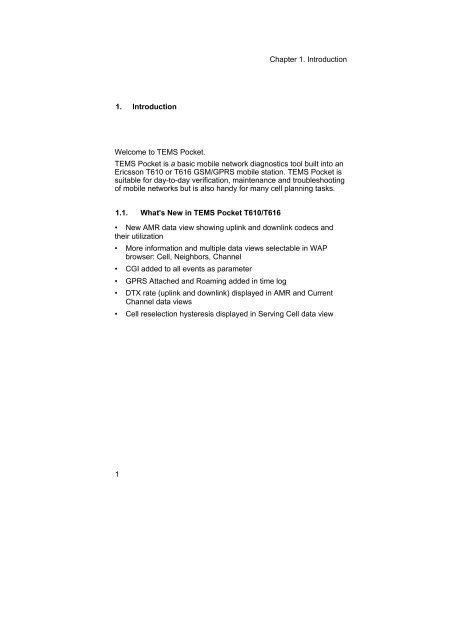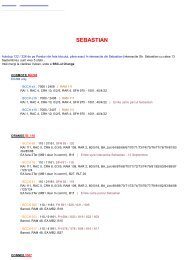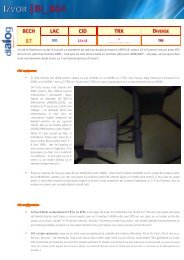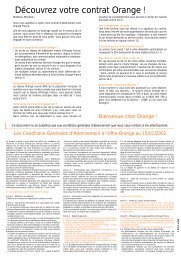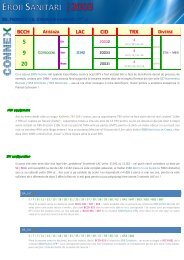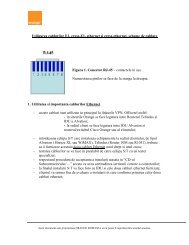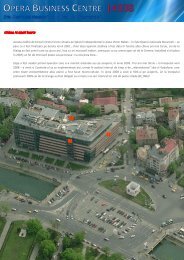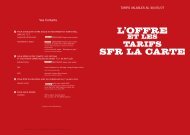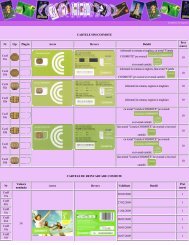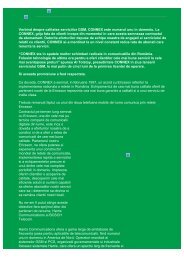You also want an ePaper? Increase the reach of your titles
YUMPU automatically turns print PDFs into web optimized ePapers that Google loves.
1. Introduction<br />
Welcome to <strong>TEMS</strong> <strong>Pocket</strong>.<br />
Chapter 1. Introduction<br />
<strong>TEMS</strong> <strong>Pocket</strong> is a basic mobile network diagnostics tool built into an<br />
Ericsson T610 or T616 GSM/GPRS mobile station. <strong>TEMS</strong> <strong>Pocket</strong> is<br />
suitable for day-to-day verification, maintenance and troubleshooting<br />
<strong>of</strong> mobile networks but is also handy for many cell planning tasks.<br />
1.1. What's New in <strong>TEMS</strong> <strong>Pocket</strong> T610/T616<br />
• New AMR data view showing uplink and downlink codecs and<br />
their utilization<br />
• More information and multiple data views selectable in WAP<br />
browser: Cell, Neighbors, Channel<br />
• CGI added to all events as parameter<br />
• GPRS Attached and Roaming added in time log<br />
• DTX rate (uplink and downlink) displayed in AMR and Current<br />
Channel data views<br />
• Cell reselection hysteresis displayed in Serving Cell data view<br />
1
<strong>TEMS</strong> <strong>Pocket</strong> GSM T610/T616 User's Manual<br />
2. Overview<br />
2.1. Data Views<br />
Most <strong>of</strong> the data displayed by <strong>TEMS</strong> <strong>Pocket</strong> is to be found in data<br />
views. When you turn the phone on the first time it will display the<br />
Serving Cell data view.<br />
On later occasions, when turned on, the mobile will display the data<br />
view last inspected, provided that the <strong>Pocket</strong> functions are activated.<br />
You browse the data views by moving the joystick up and down.<br />
The top section <strong>of</strong> the display preserves the ordinary mobile phone<br />
indicators signal strength and battery power level, as well as other<br />
symbols appearing under various conditions. Above the signal<br />
strength bars, GPRS availability is indicated by the following means:<br />
If nothing is drawn above the bars, the mobile has no<br />
GPRS coverage, or the subscription does not support<br />
GPRS (the mobile attempted GPRS attach but failed).<br />
A blue contour indicates that there is GPRS coverage,<br />
but the mobile has not yet attempted to attach to<br />
GPRS.<br />
A solid blue triangle indicates that the mobile has<br />
successfully attached to GPRS.<br />
2
Chapter 2. Overview<br />
If the default phone display with the operator's name appears<br />
instead, this is because the <strong>Pocket</strong> functions are turned <strong>of</strong>f.<br />
To turn <strong>Pocket</strong> data views on:<br />
• Press the button labeled More on the screen.<br />
• Move the joystick down to select "<strong>Pocket</strong> View On".<br />
• Press Select.<br />
The data views are fully described in chapter 3.<br />
2.2. Menus<br />
The <strong>TEMS</strong> <strong>Pocket</strong> phone has a special <strong>Pocket</strong> menu from which you<br />
change settings in <strong>TEMS</strong> <strong>Pocket</strong>. Moreover, the <strong>Pocket</strong> menu is<br />
used to access certain categories <strong>of</strong> data (sometimes there is also a<br />
shortcut).<br />
To access the <strong>Pocket</strong> menu:<br />
3
<strong>TEMS</strong> <strong>Pocket</strong> GSM T610/T616 User's Manual<br />
• Move the joystick right once, then right once more and twice<br />
down. The Settings icon is selected:<br />
• Press Select and then Select again to enter the <strong>Pocket</strong> main<br />
The submenus seen here are described in chapter 4.<br />
2.3. Note on <strong>TEMS</strong> Realtime Tools<br />
<strong>TEMS</strong> mobiles delivered with the realtime diagnostics tools <strong>TEMS</strong><br />
Investigation and <strong>TEMS</strong> Light have full <strong>TEMS</strong> <strong>Pocket</strong> functionality.<br />
When such mobiles are connected to one <strong>of</strong> the realtime tools, you<br />
can still inspect their <strong>TEMS</strong> <strong>Pocket</strong> data views (chapter 3). You can<br />
also inspect the event log, by accessing it from a data view through<br />
the Quick menu (section 3.16).<br />
However, while <strong>TEMS</strong> <strong>Pocket</strong> is connected to a realtime tool, you<br />
cannot use the <strong>TEMS</strong> <strong>Pocket</strong> network control functions or change<br />
network settings (sections 4.5- 4.8 in this manual). All such functions<br />
are disabled as long as the phone is connected.<br />
4
3. Data Views<br />
3.1. General<br />
Chapter 3. Data Views<br />
All data views have the same general structure in idle and dedicated<br />
mode. When a parameter is currently not valid (such as C1 and C2<br />
in dedicated mode), this is indicated in the data view by a string <strong>of</strong><br />
dashes "- -" <strong>of</strong> appropriate length. In a few places one parameter is<br />
replaced by another when the mode changes. These differences are<br />
<strong>of</strong> course noted in the subsequent sections.<br />
Certain parameters are presented both numerically and graphically,<br />
the number being superimposed on a colored bar whose length and<br />
color depend on the parameter value. These parameters are tagged<br />
"numeric/graphic" in sections 3.3-3.14. The rules for the graphic<br />
presentation are found in appendix B, page 67.<br />
Tip: To fine-tune the appearance <strong>of</strong> the colors, you may find it<br />
helpful to adjust the display contrast (Settings menu<br />
Display<br />
Contrast).<br />
In the case <strong>of</strong> frequency hopping, the hopping list is shown one<br />
channel at a time, a new channel appearing each second (e.g. TC in<br />
the Serving Cell view, section 3.3).<br />
3.2. The Built-in Help Function<br />
For all data views a corresponding help view is available. Each help<br />
view has the same organization as the data view but displays<br />
mnemonics for the parameters where the data view displays the<br />
parameters themselves:<br />
5
<strong>TEMS</strong> <strong>Pocket</strong> GSM T610/T616 User's Manual<br />
Data view Help view<br />
In this chapter, data views and help views are shown side by side,<br />
and the view contents are explained by referring to the mnemonics<br />
in the help view.<br />
To enter the help view (while in a <strong>Pocket</strong> data view):<br />
• Press More. The More menu appears. Choose <strong>Pocket</strong> Help On<br />
(most easily done by pressing the "3" key).<br />
To return to the data view:<br />
• Press More and choose <strong>Pocket</strong> Help Off. (Alternatively, press<br />
More and then "3".)<br />
6
3.3. Serving Cell (1)<br />
Idle mode<br />
Dedicated<br />
mode<br />
Help view<br />
(idle<br />
mode)<br />
Chapter 3. Data Views<br />
The top part describes the broadcast and<br />
traffic channels used and the channel quality.<br />
L: Logical Channel<br />
Line 1:<br />
• В: ВССН<br />
Line 2: One <strong>of</strong><br />
• Т: ТСН<br />
• t: Hopping TCH<br />
• S: SDCCH<br />
• s: Hopping SDCCH<br />
• P: PBCCH<br />
• p: Hopping PBCCH<br />
• D: PDTCH<br />
• d: Hopping PDTCH<br />
BC: Serving Cell BCCH ARFCN<br />
BS: Base Station Identity Code (BSIC)<br />
RxLv: Received Signal Strength (RxLev),<br />
numeric/ graphic<br />
TC: Traffic Channel (TCH ARFCN) or Standalone<br />
Dedicated Control Channel (SDCCH<br />
ARFCN) or Packet Dedicated Traffic Channel<br />
(PDTCH ARFCN}. Hopping channels are<br />
shown one at a time; see section 3.1.<br />
TS: Timeslot Number<br />
Tx: Transmit Power, numeric/graphic<br />
C/l: Carrier-to-interference ratio in dB. In<br />
dedicated mode: C/l for the traffic channel<br />
currently indicated by L on line 2. That is, for<br />
hopping channels the displaying <strong>of</strong> C/l values<br />
is synchronized with the traversal <strong>of</strong> the<br />
hopping list; cf. section 3.1. In idle mode: C/l<br />
for the BCCH indicated by L on line 1.<br />
Numeric/graphic presentation.<br />
C/l is supported for the modes BCCH,<br />
TCH/F, TCH/H, TCH/M, and PDTCH.<br />
7
<strong>TEMS</strong> <strong>Pocket</strong> GSM T610/T616 User's Manual<br />
8<br />
RQ: Receive Bit Error Rate<br />
(RxQual), numeric/graphic<br />
FE: Frame Erasure Rate (FER),<br />
numeric/graphic ТА: Timing Advance<br />
DSC (idle mode): Downlink Signalling<br />
Counter (Current/Max). In dedicated mode,<br />
DSC is replaced by RLT, Radio Link Timeout<br />
(Current/Max).<br />
ChM: Channel Mode; same as in section 3.7<br />
RH: Cell Reselection Hysteresis<br />
CiMd: Ciphering Mode; same as in section<br />
3.7<br />
The bottom part describes the CGI (Cell<br />
Global Identity) and RAC (Routing Area<br />
Code) <strong>of</strong> the serving cell.<br />
MCC: Mobile Country<br />
Code MNC: Mobile<br />
Network Code LAC:<br />
Location Area Code RA:<br />
Routing Area Code Cl:<br />
Cell Identity
3.4. Neighbor List (2)<br />
Chapter 3. Data Views<br />
Presents the BSIC and signal strength<br />
(RxLev} <strong>of</strong> the serving cell and the six<br />
strongest cells in the neighbor list.<br />
L: Logical Channel<br />
• В: ВССН<br />
• P: PBCCH<br />
• p: Hopping PBCCH<br />
• S: SDCCH<br />
• s: Hopping SDCCH<br />
• Т: ТСН<br />
• t: Hopping TCH<br />
• D: PDTCH<br />
• d: Hopping PDTCH<br />
BC: Serving Cell BCCH ARFCN<br />
NC1 ... NC6: Neighbor Cell BCCH ARFCN<br />
BS: Base Station Identity Code (BSIC)<br />
RxLv: Received Signal Strength (RxLev),<br />
numeric/ graphic<br />
You can lock on a cell that is listed in this view; see section 3.16.<br />
9
<strong>TEMS</strong> <strong>Pocket</strong> GSM T610/T616 User's Manual<br />
3.5. Cell Selection (3)<br />
Presents location area/routing area<br />
properties and cell selection criteria for the<br />
serving cell and the six strongest cells in the<br />
neighbor list.<br />
L: Logical Channel<br />
• В: ВССН<br />
• P: PBCCH<br />
• p: Hopping PBCCH<br />
• S: SDCCH<br />
• s: Hopping SDCCH<br />
• Т: ТСН<br />
• t: Hopping TCH<br />
• D: PDTCH<br />
• d: Hopping PDTCH<br />
BC: Serving Cell BCCH ARFCN<br />
NC1 ... NC6: Neighbor Cell BCCH ARFCN<br />
A: Location Area/Routing Area properties:<br />
• S: Same LA/RA<br />
• L: Different LA<br />
• R: Same LA, different RA<br />
• P: PLMN not matching<br />
• -: Unknown<br />
R: Routing Area Color, RACo {0 ... 7}. Invalid<br />
("-"} if GPRS not available in network.<br />
If the cell does not broadcast packet<br />
channels (no PBCCH), the two rightmost<br />
columns are:<br />
C1: Pathloss criterion C1<br />
C2: Cell reselection criterion C2<br />
If the cell supports packet channels<br />
(broadcasts a PBCCH), the two rightmost<br />
columns become:<br />
C31: GPRS signal strength threshold<br />
criterion C31 C32: GPRS cell ranking<br />
criterion C32 (Numeric/graphic presentation<br />
<strong>of</strong> all four criteria.)<br />
You can lock on a cell that is listed in this view; see section 3.16.<br />
10
3.6. Cell Identity (4)<br />
You<br />
Chapter 3. Data Views<br />
Presents the LAC, Cl, and RxLev <strong>of</strong> the<br />
serving cell and the six strongest cells in the<br />
neighbor list.<br />
LAC: Location Area Code<br />
Cl: Cell Identity<br />
RxLv: Received Signal Strength (RxLev),<br />
numeric/ graphic<br />
can lock on a cell that is listed in this view; see section 3.16.
<strong>TEMS</strong> <strong>Pocket</strong> GSM T610/T616 User's Manual<br />
3.7. Current Channel (5)<br />
12<br />
3.7.1. General<br />
Line 1 repeats some basic<br />
information. L: Logical Channel<br />
Line 1: В for BCCH<br />
Line 2: One <strong>of</strong><br />
• T: TCH, t: Hopping TCH<br />
• S: SDCCH, s: Hopping SDCCH<br />
• P: PBCCH, p: Hopping PBCCH<br />
• D: PDTCH, d: Hopping PDTCH<br />
BC: Serving Cell BCCH ARFCN<br />
BS: Base Station Identity Code (BSIC)<br />
RxLv: Received Signal Strength (RxLev),<br />
numeric/ graphic<br />
3.7.2. Idle Mode<br />
Lines 2-3 are shown in idle mode.<br />
CN: CCCH configuration, number <strong>of</strong><br />
BCCH/CCCH timeslots {0 ... 6}; see<br />
appendix A.3, page 60<br />
BP: BS-PA-MFRMS, number <strong>of</strong><br />
multiframes between paging subgroups<br />
{2 ... 9}<br />
BA: BS-AG-BLKS-RES, number <strong>of</strong> CCCH<br />
blocks reserved for AGCH {0 ... 7}<br />
AD: Attach/Detach enabled (0: No, 1: Yes};<br />
see appendix A.4, page 60<br />
MT: MS-TXPWR-MAX-CCH, maximum<br />
RACH power in dBm {900: 5 ... 39; 1800:<br />
0 ...36; 1900: 0... 33}<br />
RAM: RXLEV-ACCESS-MIN, minimum<br />
RxLev required for accessing the cell [GSM<br />
units: 0 ... 63; dBm:-110...-47}<br />
T32/12: T3212, current time/max time<br />
between location updates {Off, 0 ... 1530<br />
minutes}
3.7.3. Dedicated Mode<br />
Chapter 3. Data Views<br />
Lines 4-7 are shown in dedicated mode.<br />
They relate to DTX, channel type, frequency<br />
hopping, and ciphering.<br />
DXU: DTX rate {%) on uplink<br />
DXD: DTX rate (%) on<br />
downlink<br />
ChTyp: Channel type, one <strong>of</strong> {BCCH,<br />
PBCCH, PDTCH, SDCCH, TCH/F, TCH/H};<br />
see appendix A.5, page 61<br />
ChM: Channel mode, one <strong>of</strong> {FR, EFR, HR,<br />
AFR, AHR; D24, D48, D96, D144}:<br />
• FR = Speech, Full Rate<br />
• EFR - Speech, Enhanced Full Rate<br />
• HR = Speech, Half Rate<br />
• AFR = Speech, AMR Full Rate<br />
• AHR = Speech, AMR Half Rate<br />
• D24 = Data 2.4 kbit/s, etc.<br />
SU: Subchannel Number {0 ... 7}<br />
HO: Frequency Hopping On/Off {0: Off, 1:<br />
On; see appendix A.7, page 61}<br />
HS: Hopping Sequence Number {0 ,.. 63}<br />
Ml: МАIO, Mobile Allocation <strong>Index</strong><br />
Offset {0 ... 63}<br />
CP: Ciphering On/Off {0: Off, 1: On}; see<br />
appendix A.8, page 61<br />
CiMd: Ciphering Mode, one <strong>of</strong> {A5/1, A5/2,<br />
GEA/1, GEA/2}<br />
13
<strong>TEMS</strong> <strong>Pocket</strong> GSM T610/T616 User's Manual<br />
3.8. Paging & RACH (6)<br />
14<br />
3.8.1. General<br />
Line 1 repeats some basic<br />
information. L: Logical Channel<br />
Line 1: В for<br />
BCCH Line 2:<br />
One <strong>of</strong><br />
• T: TCH, t: Hopping TCH<br />
• S: SDCCH, s: Hopping SDCCH<br />
• P: PBCCH, p: Hopping PBCCH<br />
• D: PDTCH, d: Hopping PDTCH<br />
BC: Serving Cell BCCH ARFCN<br />
BS: Base Station Identity Code (BSIC)<br />
RxLv: Received Signal Strength (RxLev),<br />
numeric/ graphic<br />
3.8.2, Paging<br />
Lines 2-4 show information on the currently<br />
used Paging Channel and other paging<br />
parameters.<br />
Mobile Paging Subgroup (CG, PM, RB):<br />
CG: CCCH Group, used CCCH<br />
timeslot {0, 2, 4, 6}<br />
PM: Paging Multiframe Group {0 ...<br />
8}<br />
PB: Paging Block <strong>Index</strong> {0 ... 8}<br />
TMSI: Temporary Mobile Subscriber Identity<br />
(hex); not valid when Ignore TMSI is active<br />
(section 4.5.8, page 40)<br />
PTMSI: Packet TMSI (hex); not valid when<br />
the mobile is not GPRS attached, or when<br />
Ignore TMSI is active (section 4.5.8, page<br />
40)
3.8.3. RACH<br />
Chapters. Data Views<br />
Lines 5-6 show information on the<br />
Random Access Channel.<br />
CB: Cell Barred {0: No, 1: Yes}<br />
RE: Call Re-establishment {0: Allowed,<br />
1: Not allowed}<br />
RM: Max number <strong>of</strong> retransmissions {1,2, 4,<br />
7}<br />
RN: Number <strong>of</strong> RACH bursts sent for the<br />
last connection {1 ... 7}<br />
RB: Establishment Cause/Random:<br />
Reference used in the latest RACH burst {00<br />
... FF}<br />
H: Latest GPRS Access Type: 1 phase or 2<br />
phase access {1,2,-}<br />
BU: GPRS Access Burst Type: 8 bit or 11 bit<br />
bursts {8,11-}<br />
15
<strong>TEMS</strong> <strong>Pocket</strong> GSM T610/T616 User's Manual<br />
3.9. CA List (7)<br />
16<br />
Shows the frequencies used by the current<br />
cell. The list holds a maximum <strong>of</strong> 64 entries.<br />
• To scroll the list, press the joystick to<br />
enter scroll mode. The top row is<br />
highlighted. Then move the joystick up<br />
and down to scroll. Press the Return key<br />
to exit scroll mode.
3.10. BA List (8)<br />
Chapter 3. Data Views<br />
Shows all neighbors <strong>of</strong> the current cell. The<br />
list holds a maximum <strong>of</strong> 64 entries.<br />
• To scroll the list, press the joystick to<br />
enter scroll mode. The top row is<br />
highlighted. Then move the joystick up<br />
and down to scroll. Press the Return key<br />
to exit scroll mode.<br />
17
<strong>TEMS</strong> <strong>Pocket</strong> GSM T610/T616 User's Manual<br />
3.11. GPRS Data (9)<br />
18<br />
3.11.1. The GPRS Connection<br />
Line 1 repeats some basic information. Lines<br />
2-3 show data on the GPRS connection.<br />
L: Logical Channel<br />
Line 1:BforBCCH<br />
Line 2: One <strong>of</strong><br />
• Т: ТСН<br />
• t: Hopping TCH<br />
• S: SDCCH<br />
• s: Hopping SDCCH<br />
• P: PBCCH<br />
• p; Hopping PBCCH<br />
• D: PDTCH<br />
• d: Hopping PDTCH<br />
BC: Serving Cell BCCH ARFCN<br />
BS: Base Station Identity Code (8SIC)<br />
RxLv: Received Signal Strength (RxLev),<br />
numeric/ graphic<br />
TC: Traffic Channel (TCH ARFCN) or Standalone<br />
Dedicated Control Channel (SDCCH<br />
ARFCN) or Packet Dedicated Traffic Channel<br />
(PDTCH ARFCN)<br />
TS: Timeslots used on uplink and downlink.<br />
The timeslots are represented by the<br />
numbers 0-7, and those currently in use are<br />
replaced by arrows as<br />
follows:<br />
• Upward arrow: Timeslot used on uplink<br />
• Downward arrow: Timeslot used on<br />
downlink<br />
• Double-headed arrow: Bidirectional<br />
timeslot<br />
used on both uplink and downlink<br />
Example: 01234 means that TS 5 and 7<br />
are being used on the downlink and TS 6 on<br />
both uplink and downlink.
CSd: Channel coding scheme on<br />
downlink {1 ... 4}<br />
Chapter 3. Data Views<br />
CSu: Channel coding scheme on uplink<br />
(1 ... 4}<br />
3.11.2. GPRS Performance and<br />
Performance Statistics<br />
Lines 4-7 report the current performance <strong>of</strong><br />
and some statistics on the GPRS data<br />
transfer.<br />
Line 4: LLC protocol level,<br />
downlink Line 5: RLC protocol<br />
level, downlink Line 6: LLC<br />
protocol level, uplink Line 7: RLC<br />
protocol level, uplink<br />
Bs: Instantaneous data transfer rate in bytes/s<br />
Er: Percentage <strong>of</strong> data blocks<br />
erroneously decoded (on downlink),<br />
numeric/graphic<br />
Re: Percentage <strong>of</strong> data blocks resent (on<br />
uplink), numeric/graphic<br />
TotLLC: Total number <strong>of</strong> bytes transferred at<br />
the LLC level (K = kilobytes, M = megabytes)<br />
TotRLC: Total number <strong>of</strong> bytes transferred at<br />
the RLC level (K = kilobytes, M = megabytes)<br />
The TotLLC and TotRLC counters can be<br />
reset from the Quick menu: see section 3.16.<br />
19
<strong>TEMS</strong> <strong>Pocket</strong> GSM Т610/T616 User's Manual<br />
3.12. GPRS Cell/PDP(10)<br />
20<br />
3.12.1. GPRS Cell Configuration<br />
Line 1 repeats some basic information. Lines<br />
2-4 show data on the configuration <strong>of</strong> the<br />
GPRS cell.<br />
L: Logical Channel<br />
• В: ВССН<br />
• P: PBCCH, p: Hopping PBCCH<br />
• S: SDCCH, s: Hopping SDCCH<br />
• T: TCH, t: Hopping TCH<br />
• D: PDTCH, d: Hopping PDTCH<br />
BC: Serving Cell BCCH ARFCN<br />
BS: Base Station Identity Code (BSIC)<br />
RxLv: Received Signal Strength (RxLev),<br />
numeric/graphic<br />
A: GPRS Attached {A: Attached, -: Not<br />
attached}<br />
S: System Information 13 position {N: Normal<br />
BCCH, E: Extended BCCH, -: Not present}<br />
NMO: Network Mode <strong>of</strong> Operation {I, II, III};<br />
see appendix A. 10, page 62<br />
DX: DRX Timer Max, see GSM 04.60, sec.<br />
5.5.1.5<br />
Т8: Т3168 timer start value (Packet Uplink<br />
Assignment Timer), see GSM 04.60, sec.<br />
13.1 {value in hundreds <strong>of</strong> milliseconds,<br />
assigned in System Information}<br />
T192:T3192 timer start value (Packet Final<br />
Block Timer), see GSM 04.60, sec. 13.1<br />
{value in ms, assigned in System<br />
Information}<br />
G: GMM State {-: No GPRS available, I: Idle,<br />
R: Ready, S: Standby}<br />
T3314: T3314 timer start value (GMM Ready<br />
Timer), Current/Start; see GSM 04.08, sec.<br />
4.7.2<br />
PDP Address: IPv4 PDP address (12digit<br />
number)
Delay Class<br />
0: Subscribed<br />
1: Delay class 1<br />
2: Delay class 2<br />
3: Delay class 3<br />
4: Delay class 4 (best effort)<br />
3.12.2. PDP Context Request<br />
See GSM 04.08, sec. 10.5.6.5.<br />
D: Delay Class {0... 4}<br />
R: Reliability Class {0 ... 5}<br />
K: Peak Throughput {0 ... 9}<br />
P: Precedence Class {0 ... 3}<br />
MT: Mean Throughput {0 ... 18,31}<br />
Chapter 3, Data Views<br />
For meanings <strong>of</strong> values, see below.<br />
Reliability Class<br />
0: Subscribed<br />
1: Acknowledged GTP, LLC, and RLC; Protected data<br />
2: Unacknowledged GTP; Acknowledged LLC and RLC, Protected<br />
data<br />
3: Unacknowledged GTP and LLC; Acknowledged RLC, Protected<br />
data<br />
4: Unacknowledged GTP, LLC, and RLC, Protected data<br />
5: Unacknowledged GTP, LLC, and RLC, Unprotected data<br />
Peak Throughput<br />
0: Subscribed<br />
1: Up to 1 000 octet/s<br />
2: Up to 2 000 octet/s<br />
3: Up to 4 000 octet/s<br />
21
<strong>TEMS</strong> <strong>Pocket</strong> GSM Т610/Т616<br />
User's Manual<br />
4: Up to 8 000 octet/s<br />
5: Up to 16 000 octet/s<br />
6: Up to 32 000 octet/s<br />
7: Up to 64 000 octet/s<br />
8: Up to 128 000<br />
octet/s<br />
9: Up to 256 000<br />
octet/s<br />
Precedence Class<br />
0: Subscribed<br />
1: High priority<br />
2: Normal priority<br />
3: Low priority<br />
Mean Throughput<br />
0: Subscribed<br />
1: 100 octet/h<br />
2: 200 octet/h<br />
3: 500 octet/h<br />
4: 1 000 octet/h<br />
5: 2 000 octet/h<br />
6: 5 000 octet/h<br />
7:10 000 octet/h<br />
8: 20 000 octet/h<br />
9: 50 000 octet/h<br />
10: 100 000 octet/h<br />
11: 200 000 octet/h<br />
12: 500 000 octet/h<br />
13: 1 000 000 octet/h<br />
14: 2 000 000 octet/h<br />
15: 5 000 000 octet/h<br />
16: 10 000 000 octet/h<br />
17: 20 000 000 octet/h<br />
18: 50 000 000 octet/h<br />
31: Best effort<br />
22
3.13. AMR (11)<br />
3.13.1. General<br />
Chapter 3. Data Views<br />
Lines 1-3 are the same as in the Serving Cell<br />
data view (3.3); they are repeated here for<br />
convenience.<br />
L: Logical Channel<br />
Line 1:<br />
• В: ВССН<br />
Line 2: One <strong>of</strong><br />
• Т: ТСН<br />
• t: Hopping TCH<br />
• S: SDCCH<br />
• s: Hopping SDCCH<br />
• P: PBCCH<br />
• p: Hopping PBCCH<br />
• D: PDTCH<br />
• d: Hopping PDTCH<br />
BC: Serving Cell BCCH ARFCN<br />
BS: Base Station Identity Code (BSIC)<br />
RxLv: Received Signal Strength (RxLev),<br />
numeric/ graphic<br />
TC: Traffic Channel (TCH ARFCN) or Standalone<br />
Dedicated Control Channel (SDCCH<br />
ARFCN} or Packet Dedicated Traffic Channel<br />
(PDTCH ARFCN). Hopping channels are<br />
shown one at a time; see section 3.1.<br />
TS: Timeslot Number<br />
Tx: Transmit Power, numeric/graphic
<strong>TEMS</strong> <strong>Pocket</strong> GSM T610/T616 User's Manual<br />
24<br />
C/l: Carrier-to-interference ratio in dB. In<br />
dedicated mode: C/l for the traffic channel<br />
currently indicated by L on line 2. That is, for<br />
hopping channels the displaying <strong>of</strong> C/l values<br />
is synchronized with the traversal <strong>of</strong> the<br />
hopping list; cf. section 3.1. In idle mode: C/l<br />
for the BCCH indicated by L on line 1.<br />
Numeric/graphic presentation.<br />
C/l is supported for the modes BCCH,<br />
TCH/F, TCH/H, TCH/M, and PDTCH.<br />
RQ: Receive Bit Error Rate<br />
(RxQual), numeric/graphic<br />
FE: Frame Erasure Rate (FER),<br />
numeric/graphic<br />
3.13.2. DTX and AMR<br />
Lines 4-8 deal with DTX rate and AMR<br />
codec usage.<br />
DXU: DTX rate (%) on uplink<br />
DXD: DTX rate (%) on<br />
downlink<br />
CUL: AMR codec used on uplink<br />
ULU: Utilization <strong>of</strong> this uplink AMR codec<br />
CDL: AMR codec used on downlink<br />
DLU: Utilization <strong>of</strong> this downlink AMR codec
Views 3.14. C/l(12)<br />
Chapter 3. Data<br />
Shows the carrier-to-interference ratio, C/l,<br />
for broadcast and traffic channels.<br />
L: Logical Channel<br />
• В: ВССН<br />
• P: PBCCH<br />
• p: Hopping PBCCH<br />
• S: SDCCH<br />
• s: Hopping SDCCH<br />
• Т: ТСН<br />
• t: Hopping TCH<br />
• D: PDTCH<br />
• d: Hopping PDTCH<br />
BC: Serving Cell BCCH ARFCN<br />
BS: Base Station Identity Code (BSIC)<br />
RxLv: Received Signal Strength (RxLev),<br />
numeric/ graphic<br />
C/IA: In dedicated mode: TCH or PDTCH<br />
ARFCNs (channels in hopping list, sorted by<br />
ascending C/l). In idle mode: BCCH ARFCN<br />
(only one line).<br />
C/l: C/l value in dB for this channel,<br />
numeric/graphic
<strong>TEMS</strong> <strong>Pocket</strong> GSM T610-T616 User's Manual<br />
3.15. The WAP Browser Data Views<br />
While the WAP browser is running, <strong>TEMS</strong> <strong>Pocket</strong> can show<br />
selected air interface information in the bottom part <strong>of</strong> the screen.<br />
There are three data views to choose from:<br />
• Cell (section 3.15.1)<br />
• Neighbors {section 3.15.2)<br />
• Channel (section 3.15.3)<br />
Use the "+" and "-" buttons on the left side <strong>of</strong> the mobile (below the<br />
camera button) to loop through the WAP browser data views.<br />
The presented data consists <strong>of</strong> selections from the corresponding<br />
ordinary data views. Everything is repeated here for convenience.<br />
3.15.1. Cell<br />
26<br />
L: Logical Channel<br />
• В: ВССН<br />
• P: PBCCH<br />
• p: Hopping PBCCH<br />
• S: SDCCH<br />
• s: Hopping SDCCH<br />
• Т: ТСН<br />
• t: Hopping TCH<br />
• D: PDTCH<br />
• d: Hopping PDTCH<br />
BC: Serving Cell BCCH ARFCN<br />
BS: Base Station Identity Code (BSIC)<br />
RxLv: Received Signal Strength (RxLev),<br />
numeric/ graphic<br />
MCC: Mobile Country Code<br />
MNC: Mobile Network Code<br />
LAC: Location Area Code<br />
Cl: Cell Identity
3.15.2. Neighbors<br />
L: Logical Channel<br />
• В: ВССН<br />
• P: PBCCH<br />
• p: Hopping PBCCH<br />
• S: SDCCH<br />
• s: Hopping SDCCH<br />
• Т: ТСН<br />
• t: Hopping TCH<br />
• D: PDTCH<br />
• d: Hopping PDTCH<br />
BC: Serving Cell BCCH ARFCN<br />
Chapter 3. Data Views<br />
NC1, NC2: Neighbor Cell BCCH ARFCN<br />
BS: Base Station Identity Code (BSIC)<br />
RxLv: Received Signal Strength (RxLev),<br />
numeric/ graphic<br />
27
<strong>TEMS</strong> <strong>Pocket</strong> GSM Т610/Т616 User's Manual<br />
3.15.3. Channel<br />
28<br />
L: Logical Channel<br />
• В: ВССН<br />
• P: PBCCH<br />
• p: Hopping PBCCH<br />
• S: SDCCH<br />
• s: Hopping SDCCH<br />
• Т: ТСН<br />
• t: Hopping TCH<br />
• D: PDTCH<br />
• d: Hopping PDTCH<br />
BC: Serving Cell BCCH ARFCN<br />
BS: Base Station Identity Code (BSIC)<br />
RxLv: Received Signal Strength (RxLev),<br />
numeric/<br />
graphic<br />
TC: Traffic Channel (TCH ARFCN) or Standalone<br />
Dedicated Control Channel (SDCCH<br />
ARFCN) or Packet Dedicated Traffic Channel<br />
(PDTCH ARFCN)<br />
TS: Timeslots used on uplink and downlink.<br />
The timeslots are represented by the numbers<br />
0-7, and those currently in use are replaced<br />
by arrows as follows:<br />
• Upward arrow; Timeslot used on uplink<br />
• Downward arrow: Timeslot used on<br />
downlink<br />
• Double-headed arrow: Bidirectional<br />
timeslot used on both uplink and downlink<br />
Example: 01234 means that TS 5 and 7<br />
are being used on the downlink and TS 6 on<br />
both uplink and downlink.
Chapter 3. Data Views<br />
The WAP browser data view can be turned on and <strong>of</strong>f from the<br />
Settings menu<br />
• see section 4.5.2, page 38. Alternatively, when a WAP session is<br />
ongoing, the visibility <strong>of</strong> the WAP browser data view can be<br />
controlled from the More menu when accessed from the WAP<br />
browser (press the key labeled More and choose "WAP View<br />
Off"/"WAP View On").<br />
3.16. The Quick Menu<br />
This is a special menu that is accessed from the data views. It<br />
provides a shortcut to some <strong>of</strong>ten-used operations, most <strong>of</strong> which are<br />
also available from the ordinary menus (chapter 4):<br />
3.16.1. Quick Menu in Idle Mode<br />
In idle mode the Quick menu contains the following:<br />
• Lock on channel (current serving cell, or neighbor cell: see<br />
below). This is equivalent to Lock ARFCN (section 4.8.2) in idle<br />
mode and Force HO (section 4.8.3) in dedicated mode.<br />
• Toggle logging and sound on/<strong>of</strong>f (see section 4.7.3).<br />
• View the event log (see section 4.7.1).<br />
• Reset GPRS data transfer counters (see section 4.5.10).<br />
The method <strong>of</strong> accessing the Quick menu and the range <strong>of</strong> cells you<br />
can lock on are different in different data views:<br />
29
<strong>TEMS</strong> <strong>Pocket</strong> GSM T610/T616 User's Manual<br />
3.16.1.1. Accessing the Quick Menu from Neighbor List Data<br />
Views<br />
In the data views containing a neighbor list {nos. 2-5, sections 3.4-<br />
3.6), you can lock on one <strong>of</strong> the shown neighbors or on the serving<br />
cell.<br />
• Press the joystick to enter scroll mode.<br />
• If you want to lock on a cell, scroll to that cell.<br />
• Press the joystick.<br />
(serving cell).<br />
• Press the joystick again.<br />
• Choose Unlock ARFCN.<br />
30<br />
• Lock: Lock on the selected cell.<br />
• Event Mode: Modify sound and<br />
logging<br />
settings.<br />
• View Log: View the event log.<br />
• Reset Data Counters: Reset the<br />
GPRS data transfer counters.<br />
To release the mobile:<br />
• Press the joystick to enter scroll mode.<br />
• In the data view, scroll to the top row
Chapter 3. Data Views<br />
3.16.1.2. Accessing the Quick Menu from Other Data Views<br />
In the remaining data views, you can only lock on the serving cell.<br />
• Press the joystick.<br />
• If the text size is set to medium or large (see section 4.5.1, page<br />
37),<br />
press the joystick again.<br />
• Lock: Lock on the selected cell.<br />
• Event Mode: Modify sound and logging<br />
settings.<br />
• View Log: View the event log.<br />
• Reset Data Counters: Reset the GPRS<br />
data<br />
transfer counters.<br />
To release the mobile:<br />
• Press the joystick.<br />
• If the text size is set to medium or large, press the joystick again.<br />
• Choose Unlock ARFCN.<br />
31
<strong>TEMS</strong> <strong>Pocket</strong> GSM T610/T616 User's Manual<br />
3.16.2. Quick Menu in Dedicated Mode<br />
In dedicated mode, the Quick menu contains the following:<br />
• Disable handover (see section 4.8.4, page 52).<br />
• Toggle logging and sound on/<strong>of</strong>f (see section 4.7.3, page 45).<br />
• Configure Multiband Reporting (see section 4.8.6, page 54).<br />
• View the event log (see section 4.7.1, page 44).<br />
• Reset GPRS data transfer counters (see section 4.5.10, page<br />
41).<br />
3.16.2.1. Accessing the Quick Menu in Dedicated Mode<br />
In dedicated mode the Quick menu functions are the same in all<br />
data views. How to access the menu, however, still depends on the<br />
view and the text size:<br />
• If you are in a neighbor list data view (nos. 2-5), or if the text size<br />
is set to<br />
medium or large, press the joystick twice;<br />
• otherwise, press the joystick once.<br />
• Disable HO: Disable handover.<br />
• Event Mode: Modify sound and<br />
logging<br />
settings.<br />
• Multiband Rpt: Modify Multiband<br />
Reporting.<br />
• View Log: View the event log.<br />
• Reset Data Counters: Reset the GPRS<br />
data transfer counters.<br />
When you have chosen Disable HO, it is replaced by Enable HO in<br />
the menu. Choose this command to re-enable handovers.<br />
32
4. Menus<br />
4.1. General<br />
The menus have the following main uses:<br />
• Data View menu: Choosing or hiding data views<br />
Chapter 4. Menus<br />
• Settings menu: Adjustment <strong>of</strong> miscellaneous settings (e.g.<br />
measurement<br />
units)<br />
• Info menu: Inspection <strong>of</strong> phone and SIM identities and phone<br />
usage<br />
statistics<br />
• Events menu: Viewing <strong>of</strong> event setup and event log<br />
• Cell Control menu: Control <strong>of</strong> mobile behavior in the<br />
network (cell<br />
reselection, handover, band, etc.)<br />
In addition, there is the Quick menu (section 3.16, page 29), which is<br />
accessible from the data views and provides quick access to <strong>of</strong>tenused<br />
functions.<br />
In general, the settings made in the menus are in force until you alter<br />
them again or give the Reset All command (section 4.5.10, page 41).<br />
The Cell Control settings are an exception; they revert to their<br />
defaults when the mobile is turned <strong>of</strong>f.<br />
33
<strong>TEMS</strong> <strong>Pocket</strong> GSM T610/T616 User's Manual<br />
4.2. <strong>Pocket</strong> Menu Overview<br />
All details in sections 4.5-4.8 below. How to access the <strong>Pocket</strong> menu<br />
was described in section 2.2.<br />
34
4.3. Navigating in the Menus<br />
Chapter 4. Menus<br />
The handset controls have the following functions for entering menus<br />
and navigating in the menus:<br />
Joystick • When not in menu mode: Joystick right to enter<br />
the<br />
left/right phone's top-level menus, then joystick<br />
left/right to<br />
browse menus.<br />
• In some dialogs: Move cursor when<br />
entering a<br />
number.<br />
Joystick • When not in menu mode: Browse the phone's<br />
top-<br />
up/down level menus.<br />
← • In a menu: Scroll through a menu.<br />
← • In some dialogs: Scroll through the<br />
list <strong>of</strong> choices.<br />
Press joystick/ • In a menu: Enter a submenu or dialog, key<br />
labeled "Select" • In a dialog: Confirm the selected option or entered<br />
input, and exit the dialog.<br />
Return key • In a menu: Exit the menu.<br />
• In a dialog: Exit the dialog without<br />
changing<br />
anything.<br />
Key labeled "More" • When not in menu mode: Enter the More<br />
menu (containing some <strong>Pocket</strong> functions).<br />
Clear (C) key • In some dialogs: Delete a digit when<br />
entering a number.<br />
0-9 keys • In a menu: Select the menu item at the<br />
corresponding position in the list.<br />
• In some dialogs: Enter numerical values.<br />
35
<strong>TEMS</strong> <strong>Pocket</strong> GSM T610/T616 User's Manual<br />
4.4. Data View Menu<br />
In this menu you can choose a data view to display, and control the<br />
visibility <strong>of</strong> each data view.<br />
4.4.1. Menu Items for Individual Data Views<br />
This dialog exists for each data view.<br />
4.4.2. Show All<br />
If the view currently is not hidden:<br />
Go To View: Exit menu mode and<br />
immediately display the data view in<br />
question.<br />
Show View: (Disabled, since the view is<br />
currently not hidden.)<br />
Hide View: This setting causes the view to<br />
be skipped when you scroll the data view<br />
sequence.<br />
If the view currently is hidden:<br />
Go To View: Exit menu mode and display the<br />
data view. Note that in this case the view is<br />
still regarded as hidden and is shown just<br />
this once: if you scroll to a different view, and<br />
then scroll back, the hidden view will still be<br />
skipped. To make the view permanently<br />
visible again you must choose Show View in<br />
this menu (see below).<br />
Show View: Make the hidden view visible.<br />
Hide View: (Disabled, since the view is<br />
currently hidden.)<br />
This command unhides any data views that you have hidden.<br />
4.5. Settings Menu<br />
In this menu you specify various aspects <strong>of</strong> <strong>TEMS</strong> <strong>Pocket</strong> behavior<br />
and <strong>of</strong> the data presentation:<br />
36
• Text size<br />
• Visibility <strong>of</strong> WAP data view<br />
• Displaying <strong>of</strong> messages<br />
• Display backlight on/<strong>of</strong>f<br />
• LAC and Cl: Decimal or hexadecimal format<br />
• Power unit: GSM units or dBm (RxLev, TxPower)<br />
• Full/Sub values (RxLev, RxQual, FER)<br />
• Use <strong>of</strong> IMSI/TMSI<br />
• Auto answer<br />
4.5.1. Text Size<br />
Data views can have three different font sizes.<br />
Chapter 4. Menus<br />
Small: Characters are 10 pixels high. The<br />
whole data view fits into the display (except<br />
CA List and BA List if they are long<br />
enough).<br />
Medium: Characters are 14 pixels high.<br />
Scrolling needed.<br />
Large; Characters are 18 pixels high.<br />
Scrolling needed.<br />
37
<strong>TEMS</strong> <strong>Pocket</strong> GSM T610/T616 User's Manual<br />
• To scroll a view with medium or large font, press the joystick to<br />
enter scroll<br />
mode, then move the joystick up and down as usual in order to<br />
scroll.<br />
• To exit scroll mode, press the Return key<br />
4.5.2. WAP Data View<br />
When you are running WAP services you can have a <strong>Pocket</strong> data<br />
view displayed at the bottom <strong>of</strong> the WAP browser. See section 3.15,<br />
page 26.<br />
Choosing On activates the WAP data view.<br />
About preparing your phone for WAP and getting started using the<br />
service, please consult your mobile phone user manual.<br />
4.5.3. Messages<br />
38<br />
If On is chosen, messages such as those<br />
generated by divert or calling line<br />
identification will be displayed.<br />
If Off is chosen, these kinds <strong>of</strong> messages<br />
will not be displayed and so will not conceal<br />
the <strong>Pocket</strong> data views.
4.5.4. Backlight<br />
4.5.5. Cell Id Format<br />
4.5.6. Power Display<br />
Chapter 4. Menus<br />
Normal: The display backlight is turned <strong>of</strong>f<br />
after about 25 seconds <strong>of</strong> inactivity.<br />
Extended: The display backlight remains on<br />
for 20 minutes even if there is no user input.<br />
For this choice to be enabled, automatic<br />
keylock must be turned <strong>of</strong>f.<br />
Hex: LAC and Cl are displayed in<br />
hexadecimal<br />
digits.<br />
Decimal: LAC and Cl are displayed in<br />
decimal<br />
digits.<br />
dBm: RxLev and TxPower are displayed in<br />
dBm.<br />
GSM: RxLev and TxPower are displayed in<br />
GSM units.<br />
About color coding and bar length, see appendix B, page 67.<br />
39
<strong>TEMS</strong> <strong>Pocket</strong> GSM T610/T616 User's Manual<br />
4.5.7. Measure Mode<br />
4.5.8. Ignore TMSI<br />
4.5.9. Auto Answer<br />
40<br />
Full: RxLev, RxQual, and FER are presented<br />
in the form <strong>of</strong> Full values.<br />
Sub: RxLev, RxQual, and FER are<br />
presented in the form <strong>of</strong> Sub values.<br />
Normal: The mobile station is allowed<br />
to use TMSI.<br />
Activate: The mobile station is forced<br />
to use IMS!.<br />
If On is chosen, the mobile will<br />
automatically answer an incoming call.
4.5.10. Reset All<br />
Chapter 4. Menus<br />
This command restores all <strong>Pocket</strong> settings to their defaults. See<br />
appendix C, page 70 for a listing <strong>of</strong> the default settings. The GPRS<br />
data transfer counters and the event log are not affected by the<br />
reset.<br />
41
<strong>TEMS</strong> <strong>Pocket</strong> GSM T610/T616 User's Manual<br />
4.6. Info Menu 4.6.1.<br />
IMSI<br />
4.6.2. IMEI<br />
42<br />
Shows the IMSI (International Mobile<br />
Station Identity) <strong>of</strong> the SIM card used. It<br />
is made up <strong>of</strong><br />
• Country Code (3 digits)<br />
• Network Code (2 digits)<br />
• Identification Number (at most 10<br />
digits)<br />
Shows the IMEI (International Mobile<br />
Equipment Identity) <strong>of</strong> the mobile station<br />
used. It is made up <strong>of</strong><br />
• Type Approval Code (6 digits)<br />
• Final Assembly Code (2 digits)<br />
• Serial Number (6+1 digits)
4.6.3. Time Log<br />
43<br />
Chapter 4. Menus<br />
Shows the time (in hours and minutes) that the<br />
mobile station has spent in each <strong>of</strong> the<br />
following modes:
• Dedicated<br />
mode<br />
• Idle mode,<br />
Full Service<br />
• Idle mode,<br />
Limited<br />
Service (SOS<br />
calls only)<br />
• No Service<br />
• GPRS<br />
Attached<br />
• Roaming<br />
Press Reset to<br />
reset the time<br />
log.
<strong>TEMS</strong> <strong>Pocket</strong> GSM T610/T616 User's Manual<br />
4.7. Events Menu<br />
A maximum <strong>of</strong> 20 events can be stored in the event log. Once the<br />
log is full, the oldest log entry is removed whenever a new event is<br />
entered.<br />
Events can also be indicated by audio signals. You can turn sound<br />
and logging on and <strong>of</strong>f for each event type separately: see section<br />
4.7.4.<br />
The event log can be cleared by giving the Reset All command<br />
from the Settings menu; see section 4.5.10.<br />
Note: To have events logged at all, you must make sure that the<br />
event mode is set to "On". See section 4.7.3.<br />
4.7.1. View Log<br />
To view the event log:<br />
• In the Event menu, choose View Log. The most recent logged<br />
event is shown. Use the Up and Down keys to browse the log.<br />
New events are added at the end <strong>of</strong> the list, so the latest event will<br />
always have the highest number.<br />
4.7.2. Clear Log<br />
To clear the event log:<br />
• In the Event menu, choose Clear Log. Press Yes to confirm.<br />
44
4.7.3. Event Mode<br />
Chapter 4. Menus<br />
If you want <strong>TEMS</strong> <strong>Pocket</strong> to log events, you must make sure that the<br />
event mode is set to "On":<br />
• In the Events menu, choose Event Mode.<br />
• Choose On.<br />
About the sounds, see section 4.7.6.<br />
4.7.4. Event Settings<br />
The three modes have the following<br />
meanings:<br />
Pause: No logging but sound indications<br />
for chosen events<br />
On: Logging and sound indications Off:<br />
No logging and no sound indications<br />
For each event type, you can turn audio indications and logging on<br />
and <strong>of</strong>f. • Choose Event Settings.<br />
• Choose an event type to specify audio and logging properties for<br />
this<br />
event (the types are listed and described in section 4.7.5 below),<br />
or:<br />
• Choose Set All to specify the same behavior for all events.<br />
45
<strong>TEMS</strong> <strong>Pocket</strong> GSM Т610Я616<br />
User's Manual The following options<br />
exist:<br />
Off: No sound, no logging<br />
Sound: Sound, but no logging<br />
Log: Logging, but no sound<br />
Sound + Log: Sound and<br />
logging<br />
For the Limit events (RxLev Limit, RxQual Limit, ТА Limit, TxPwr<br />
Limit), once you have chosen something other than Off, you will be<br />
asked to enter the<br />
event threshold:<br />
4.7.5. List <strong>of</strong> Logged Events<br />
• Enter a threshold value. Note that the<br />
value must be in GSM units.<br />
This section lists all the events saved in the event log and their<br />
parameters. Some <strong>of</strong> the event parameters are described in more<br />
detail in the Appendix starting on page 59.<br />
The table also lists defaults for the settings described in section<br />
4.7.4.<br />
46
4.7.5.1. GSM Events<br />
All events have CGI as parameter (see section 4.7.1); other<br />
parameters appear from the table.<br />
G: Event group (N = Normal, F = Fail, L = Limit)<br />
Def: Default event settings (S = Sound, L =<br />
Logging)<br />
Chapter 4.<br />
Menus<br />
47
<strong>TEMS</strong> <strong>Pocket</strong> GSM T610/T616 User's Manual<br />
4.7.5.2. GPRS Events<br />
48
Chapter 4.<br />
Menus<br />
49
<strong>TEMS</strong> <strong>Pocket</strong> GSM T610/T616 User's Manual<br />
4.7.6. Event Sounds<br />
The sounds associated with events are as follows:<br />
• Normal group: One short beep.<br />
• Limit group: A two-note sequence with either rising or falling<br />
pitch.<br />
• For the Service event, rising pitch indicates "Service On", and<br />
falling<br />
pitch indicates "Service Off".<br />
• For other Limit events, rising pitch indicates that the event<br />
parameter<br />
exceeded the limit {or dropped below it). Falling pitch<br />
indicates that<br />
the parameter reverted to a value that is within the limit.<br />
• Fail group: A two-note sequence with falling pitch (different notes<br />
than for<br />
Limit events).<br />
4.8. Cell Control Menu<br />
In this menu are collected the functions that modify mobile station<br />
behavior in the network.<br />
4.8.1. Reset<br />
Any changes made from the default in the Cell Control menu can be<br />
undone by using the Reset command. Reset does not affect the<br />
settings in the Settings and Events menus.<br />
• In the Cell Control menu, choose Reset and press Yes to<br />
confirm.<br />
If you have not changed anything, the Reset choice is disabled and<br />
grayed.<br />
50
4.8.2. Lock ARFCN<br />
Chapter 4. Menus<br />
This function locks the mobile station on a cell which then becomes<br />
the serving cell, provided that the signal strength is sufficient. If the<br />
signal is too weak, the mobile will go into no service mode.<br />
• Choose Set ARFCN to lock on a cell. You<br />
will be asked to enter an ARFCN number.<br />
This ARFCN will then appear in the menu<br />
instead <strong>of</strong> "Set ARFCN".<br />
Here the mobile has been locked on ARFCN<br />
14.<br />
• Choose Off to release the mobile.<br />
Note that you can also lock on a cell (only the current serving cell, or<br />
a neighbor) from a data view. This is done by entering the Quick<br />
menu: see section 3.16, page 29.<br />
4.8.3. Force HO<br />
The mobile can be forced to perform a handover to a selected<br />
channel, provided that the cell is close and strong enough. The<br />
Force HO option overrides normal handover as well as Disable HO<br />
(section 4.8.4). Note that the effect <strong>of</strong> Force HO persists until it is<br />
deselected: if Force HO is chosen during a call, the handover<br />
behavior will not revert to normal when the call is ended.<br />
51
<strong>TEMS</strong> <strong>Pocket</strong> GSM Т610/T616 User's Manual<br />
4.8.4. Disable HO<br />
• Choose Set ARFCN to force handover to<br />
a channel. You will be asked to enter an<br />
ARFCN number. The chosen ARFCN will<br />
then appear in the menu instead <strong>of</strong> "Set<br />
ARFCN".<br />
Here handover has been forced to ARFCN<br />
14. •<br />
Choose Off to release the mobile.<br />
You can prevent the mobile station from performing handovers.<br />
52<br />
On: The mobile will perform no<br />
handovers.<br />
Off: The mobile will perform handovers<br />
when ordered to do so by the network.<br />
Note: If you use Force HO (section 4.8.3, below) to force<br />
handover to a selected channel, it will override Disable<br />
HO.
4.8.5. Lock Band<br />
Chapter 4. Menus<br />
You can order the mobile station to use only one <strong>of</strong> its frequency<br />
bands. This will naturally result in failed calls if the band you have<br />
blocked is the only one available in the area.<br />
Normal: No restriction.<br />
900 only, 1800 only, 1900 only: The<br />
mobile is locked to the indicated band.<br />
Note: If locked to a band during a call, the mobile will not<br />
change to the selected band immediately. At the next<br />
handover, however, it will be redirected to a cell using a<br />
channel in the selected band.<br />
53
<strong>TEMS</strong> <strong>Pocket</strong> GSM T610/T616 User's Manual<br />
4.8.6. Multiband Rpt (Multiband Reporting)<br />
The Measurement Reports sent by the mobile station to the network<br />
include data on cells in the band which the mobile is currently not<br />
using. The Multiband Rpt function in <strong>TEMS</strong> <strong>Pocket</strong> controls the<br />
Multiband Reporting value, which determines how many cells from<br />
the other band (at most three) should be included in the<br />
Measurement Report.<br />
(Below, "band A" denotes the mobile's own<br />
band, and "band B" is the other band.)<br />
Normal: The network controls the<br />
Multiband Reporting parameter.<br />
0: The mobile reports the strongest cells,<br />
irrespective <strong>of</strong> band.<br />
1: The mobile reports the strongest cell from<br />
band B, and the remaining positions are<br />
filled with cells from band A.<br />
2: The mobile reports the two strongest cells<br />
from band B, and the remaining positions<br />
are filled with cells from band A.<br />
3: The mobile reports the three strongest<br />
cells from band B, and the remaining<br />
positions are filled with cells from band A.<br />
The remaining positions in the Measurement Report are then filled<br />
with cells from the same band as the serving cell (band A). Should<br />
there not be enough <strong>of</strong> these to complete the report, more cells are<br />
picked from band В in order <strong>of</strong> descending signal strength, if<br />
available.<br />
Example<br />
The Multiband Rpt parameter has been set to 3, the mobile is on the<br />
900 band, and only two cells are currently identified on the 1800<br />
band. These two cells are then put in the report, and four 900 band<br />
neighbors are added, provided <strong>of</strong> course that at least four neighbors<br />
are identified on the 900 band.<br />
54
4.8.7. Cell Barred<br />
Chapter 4. Menus<br />
This function governs whether the mobile station is allowed to<br />
access a barred cell.<br />
4.8.8. DTX Uplink<br />
Normal: The mobile station will make no<br />
attempt to access barred cells.<br />
May Use: The mobile station is allowed to<br />
camp on barred cells.<br />
Must Use: The mobile station will use barred<br />
cells only.<br />
You can control the mobile's use <strong>of</strong> DTX (Discontinuous<br />
Transmission).<br />
Normal: The mobile station uses DTX only<br />
when allowed to by the network.<br />
On: The mobile always uses<br />
DTX. Off: The mobile never<br />
uses DTX.<br />
55
<strong>TEMS</strong> <strong>Pocket</strong> GSM T610/T616 User's Manual<br />
5. Controlling the Phone's GPRS Behavior<br />
The <strong>TEMS</strong> <strong>Pocket</strong> functions in the mobile phone do not include<br />
commands for connecting to and disconnecting from the GPRS<br />
network. This is not needed, since such basic GPRS behavior is<br />
implicitly governed by some menu settings that are in the<br />
commercial phone.<br />
5.1. GPRS Attach/Detach<br />
To control GPRS Attach and Detach, proceed as follows:<br />
• When not in menu mode, move the joystick left, then twice down,<br />
then<br />
once left. Press Select. The Connectivity menu appears.<br />
• Move the joystick down until Data comm. is selected. Press<br />
Select.<br />
• In the Data comm. menu, select Preferred service. Press<br />
Select.<br />
The setting here has the following effects:<br />
• If GPRS and GSM is chosen, the phone will automatically attach<br />
to<br />
GPRS. If this setting is active when you turn on the mobile, it will<br />
perform<br />
a GPRS attach as soon as you have entered your PIN code.<br />
• If a GPRS connection is up and you change the setting to GSM<br />
only, the<br />
phone will immediately detach from GPRS.<br />
56
5.2. PDP Context Activation<br />
Chapter 5. Controlling the Phone's GPRS Behavior<br />
A PDP context is activated automatically when you start the WAP<br />
browser (see the phone user manual for details).<br />
When you exit the WAP menu, you are asked whether you wish to<br />
close down the connection. If you do this, you also deactivate the<br />
PDP context.<br />
57
<strong>TEMS</strong> <strong>Pocket</strong> GSM Т610/T616 User's Manual<br />
6. Support Contact Information<br />
For support in the use <strong>of</strong> <strong>TEMS</strong> <strong>Pocket</strong>, please contact Ericsson<br />
according to the directions found at<br />
under the link "Contacts".<br />
58<br />
www.ericsson.com/tems
Appendix A. Parameter Values<br />
Appendix A. Parameter Values<br />
This appendix lists the possible values <strong>of</strong> some parameters<br />
appearing in the views and <strong>of</strong> some event parameters.<br />
A.1. Reject Cause<br />
2 IMSI unknown in HLR<br />
3 Illegal MS<br />
4 IMSI unknown in VLR<br />
5 IMEI not accepted<br />
6 Illegal ME<br />
11 PLMN not allowed<br />
12 Location area not allowed<br />
13 Roaming not allowed in this location<br />
area<br />
17 Network failure<br />
22 Congestion<br />
32 Service option not supported<br />
33 Requested service option not<br />
subscribed<br />
35 Service option temporarily out <strong>of</strong> order<br />
38 Call cannot be identified<br />
48-63 Retry upon entry into a new cell<br />
95 Semantically incorrect message<br />
96 Invalid mandatory information<br />
97 Message type non-existent or not implemented<br />
98 Message type not compatible with the protocol state<br />
99 Information element non-existent or not implemented<br />
100 Conditional IE error<br />
101 Message not compatible with the protocol<br />
state<br />
111 Protocol error, unspecified<br />
59
<strong>TEMS</strong> <strong>Pocket</strong> GSM T610/T616 User's Manual<br />
A.2. Radio Resource Cause<br />
0 Normal event<br />
1 Abnormal release, unspecified<br />
2 Abnormal release, channel unacceptable<br />
3 Abnormal release, timer expired<br />
4 Abnormal release, no activity on the radio path<br />
5 Preemptive release<br />
8 Handover impossible, timing advance out <strong>of</strong> range<br />
9 Channel mode unacceptable<br />
10 Frequency not implemented<br />
65 Call already cleared<br />
95 Semantically incorrect message<br />
96 Invalid mandatory information<br />
97 Message type non-existent or not implemented<br />
98 Message type not compatible with protocol state<br />
100 Conditional IE error<br />
101 No cell allocation<br />
available<br />
111 Protocol error<br />
unspecified<br />
A.3. CCCH Configuration<br />
0 1 basic physical channel used for CCCH, not combined<br />
with<br />
SDCCHs<br />
1 1 basic physical channel used for CCCH, combined with<br />
SDCCHs<br />
2 2 basic physical channels used for CCCH, not combined<br />
with<br />
SDCCHs<br />
4 3 basic physical channels used for CCCH, not<br />
combined with SDCCHs<br />
6 4 basic physical channels used for CCCH, not combined<br />
with<br />
SDCCHs<br />
A.4. Attach/Detach<br />
60<br />
0 IMSI attach not allowed<br />
1 Apply IMSI attach
A.5. Channel Type<br />
BCCH Broadcast Control Channel,<br />
Signalling PBCCH Packet Broadcast Control<br />
Channel PDTCH Packet Dedicated Traffic<br />
Channel SDCCH Stand-alone Dedicated<br />
Control Channel<br />
TCH/F Traffic Channel, Full<br />
Rate TCH/H Traffic Channel,<br />
Half Rate<br />
A.6. Channel Mode<br />
Appendix A. Parameter Values<br />
0 Signalling only<br />
1 Speech full rate version 1 (Full Rate)<br />
2 Data 14.4 kbit/s full rate<br />
3 Data 9.6 kbit/s full rate<br />
4 Data 4.8 kbit/s full rate<br />
5 Data 2.4 kbit/s full rate<br />
6 Speech full rate version 2 (Enhanced Full Rate)<br />
A.7. Frequency Hopping<br />
0 Single RF channel<br />
1 RF hopping channel<br />
A.8. Ciphering<br />
0 No ciphering<br />
1 Start ciphering<br />
A.9. Page Mode<br />
0 Normal paging<br />
1 Extended paging<br />
2 Paging reorganization<br />
61
<strong>TEMS</strong> <strong>Pocket</strong> GSM T610/T616 User's Manual<br />
A.10. GPRS Network Mode <strong>of</strong> Operation<br />
Handling <strong>of</strong> paging in the GPRS network.<br />
I Mode I: All paging on GPRS channels; Gs signalling<br />
interface<br />
present<br />
II Mode II: All paging on PCH; no Gs<br />
III Mode III: All circuit-switched paging on PCH, all packetswitched<br />
paging on PPCH; no Gs<br />
A.11. Disconnect Cause<br />
62<br />
1 Unassigned (unallocated) number<br />
3 No route to destination<br />
6 Channel unacceptable<br />
8 Operator determined barring<br />
16 Normal call clearing<br />
17 User busy<br />
18 No user responding<br />
19 User alerting, no answer<br />
21 Call rejected<br />
22 Number changed<br />
25 Pre-emption<br />
26 Non selected user clearing<br />
27 Destination out <strong>of</strong> order<br />
28 Invalid number format (incomplete number)<br />
29 Facility rejected<br />
30 Response to STATUS ENQUIRY<br />
31 Normal, unspecified (not<br />
logged)<br />
34 No circuit/channel available<br />
38 Network out <strong>of</strong> order<br />
41 Temporary failure<br />
42 Switching equipment congestion<br />
43 Access information discarded<br />
44 Requested circuit/channel not available<br />
47 Resources unavailable, unspecified<br />
49 Quality <strong>of</strong> service unavailable<br />
50 Requested facility not subscribed<br />
55 Incoming calls barred within the CUG
Appendix A. Parameter Values<br />
57 Bearer capability not authorized<br />
58 Bearer capability not presently available<br />
63 Service or option not available,<br />
unspecified<br />
65 Bearer service not implemented<br />
68 ACM equal to or greater than ACMmax<br />
69 Requested facility not implemented<br />
70 Only restricted digital information bearer<br />
capability is available<br />
79 Service or option not implemented, unspecified<br />
81 Invalid transaction identifier value<br />
87 User not member <strong>of</strong> CUG<br />
88 Incompatible destination<br />
91 Invalid transit network selection<br />
95 Semantically incorrect message<br />
96 Invalid mandatory information<br />
97 Message type non-existent or not implemented<br />
98 Message type not compatible with protocol state<br />
99 Information element non-existent or not implemented<br />
100 Conditional IE error<br />
101 Message not compatible with protocol state<br />
102 Recovery on timer<br />
expiry<br />
111 Protocol error,<br />
unspecified<br />
127 Interworking,<br />
unspecified<br />
63
<strong>TEMS</strong> <strong>Pocket</strong> GSM Т610/T616 User's Manual<br />
A.12. GPRS Attach Fail Cause<br />
3 Illegal MS<br />
6 Illegal ME<br />
7 GPRS services not allowed<br />
8 GPRS services and non-GPRS services not<br />
allowed<br />
11 PLMN not allowed<br />
12 Location area not allowed<br />
13 Roaming not allowed in this location<br />
area<br />
96 Invalid mandatory information<br />
99 IE non-existent or not implemented<br />
100 Conditional IE error<br />
111Protocol error, unspecified<br />
T3310 Fifth expiry <strong>of</strong> T3310 timer (MS side)<br />
A.13. GPRS Detach Type<br />
If GPRS Detach Cause = 1 (MS initiated)<br />
else<br />
64<br />
0 N orm al<br />
1 PowerOff<br />
1 Reattach required<br />
2 Reattach NOT required<br />
3 IMSI detach after VLR failure
A.14. GPRS Detach Cause<br />
Appendix A. Parameter Values<br />
1 MS initiated<br />
2 IMSI unknown in HLR<br />
3 Illegal MS<br />
6 Illegal ME<br />
7 GPRS services not allowed<br />
8 GPRS services and non-GPRS services not allowed<br />
10 Implicitly detached<br />
11 PLMN not allowed<br />
12 Location area not allowed<br />
13 Roaming not allowed in this location area<br />
A.15. Activate PDP Context Fail Cause<br />
26 Insufficient resources<br />
27 Missing or unknown APN<br />
28 Unknown PDP address or PDP type<br />
29 User authentication failed<br />
30 Activation rejected, unspecified<br />
31 Activation rejected by GGSN<br />
32 Service option not supported<br />
33 Requested service option not subscribed<br />
34 Service option temporarily out <strong>of</strong> order<br />
35 NSAPI already used<br />
95 Semantically incorrect message<br />
96 Invalid mandatory information<br />
97 Message type non-existent or not implemented<br />
98 Message type not compatible with the protocol state<br />
99 Information element non-existent or not<br />
implemented<br />
111Protocol error, unspecified<br />
T3380 Fifth expiry <strong>of</strong> T3380 timer (MS side)<br />
A.16. Deactivate PDP Context Cause<br />
25 LLC or SNDCP failure<br />
26 Insufficient resources<br />
65
<strong>TEMS</strong> <strong>Pocket</strong> GSM T610/T616 User's Manual<br />
36 Regular PDP context deactivation<br />
37 QoS not accepted<br />
38 Network failure<br />
39 Reactivation requested<br />
T3390 Fifth expiry <strong>of</strong> T3390 timer (MS side)<br />
A.17. Routing Area Update Fail Cause<br />
3 Illegal MS<br />
6 Illegal ME<br />
7 GPRS services not allowed<br />
9 MS identity cannot be derived by the<br />
network<br />
10 Implicitly detached<br />
11 PLMN not allowed<br />
11 Location area not allowed<br />
13 Roaming not allowed in this location<br />
area<br />
96 Invalid mandatory information<br />
99 IE non-existent or not implemented<br />
100 Conditional IE error<br />
111 Protocol error, unspecified<br />
T3330Fifth expiry <strong>of</strong> T3330 timer (MS side)<br />
66
Appendix B. Graphic Representation <strong>of</strong> Parameter Values<br />
Appendix B. Graphic Representation <strong>of</strong> Parameter Values<br />
This appendix describes the bar length and color coding used to<br />
visualize parameter values.<br />
B.1. RxLev<br />
B.2. Cell Selection (C1, C2, C31, C32)<br />
67
<strong>TEMS</strong> <strong>Pocket</strong> GSM Т610/T616 User's Manual<br />
B.3. C/I<br />
B.4. TxPower<br />
B.5. FER, RLC/LLC Decode Errors/<br />
Retransmissions<br />
68
Appendix B. Graphic Representation <strong>of</strong> Parameter Values<br />
B.6. RxQual<br />
69
<strong>TEMS</strong> <strong>Pocket</strong> GSM T610/T616 User's Manual<br />
Appendix C. Default Settings in <strong>TEMS</strong> <strong>Pocket</strong> Menus<br />
This appendix lists the defaults for all settings editable from the<br />
<strong>TEMS</strong> <strong>Pocket</strong> menus.<br />
C.1. Data View Menu<br />
• All data views visible<br />
C.2. Settings Menu<br />
• Text Size: Small<br />
• WAP View: On<br />
• Messages: Off<br />
• Cell Id Format: Hex<br />
• Power Display: dBm<br />
• Measure Mode: Sub<br />
• Ignore TMSI: Normal<br />
• Auto Answer: Off<br />
C.3. Info Menu<br />
(No user-editable settings.)<br />
C.4. Events Menu<br />
• Event Mode: On<br />
• Event Settings: Default values according to section 4.7.5, page<br />
46.<br />
70
C.5. Cell Control Menu<br />
Appendix С. Default Settings in <strong>TEMS</strong> <strong>Pocket</strong> Menus<br />
Note: Unlike the rest, these settings revert to their defaults<br />
("Off"/ "Normal") when the mobile is powered <strong>of</strong>f and<br />
on.<br />
• Lock ARFCN: Off<br />
• Force HO: Off<br />
• Disable HO: Off<br />
• Lock Band: Normal<br />
• Multiband Rpt: Normal<br />
• Cell Barred: Normal<br />
• DTX Uplink: Normal<br />
71


